2nd Paderborn Game Lab Jam
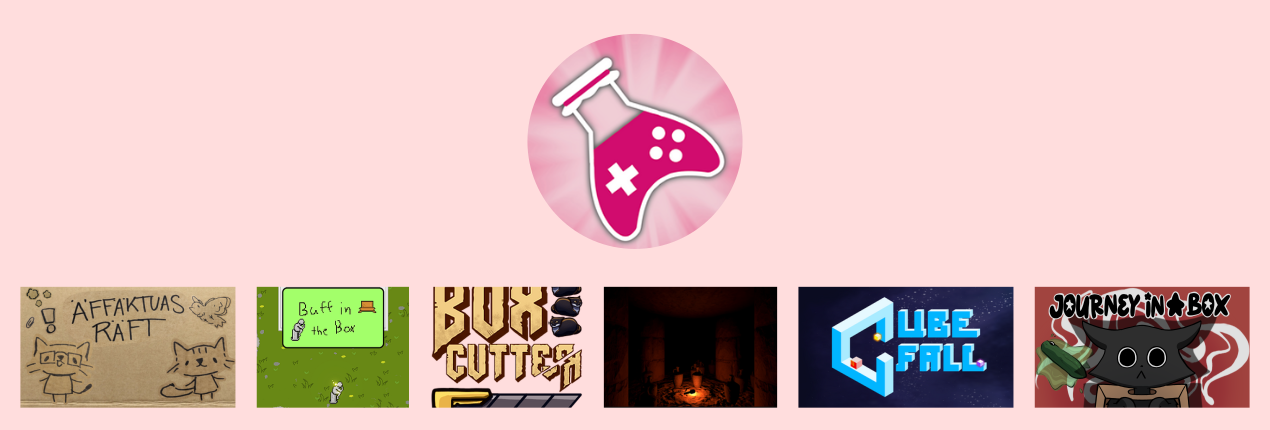
From March 21-23, 2025, the 2nd Paderborn Game Labs GameJam took place in the GamesLab in cooperation with the bib International College. Seven teams of 11 students from Paderborn University and 13 students from bib International College took part. The theme was “Think inside the Box”.
GamesLab in Winter Semester 2024/2025: Successful Development of 7 Game Prototypes
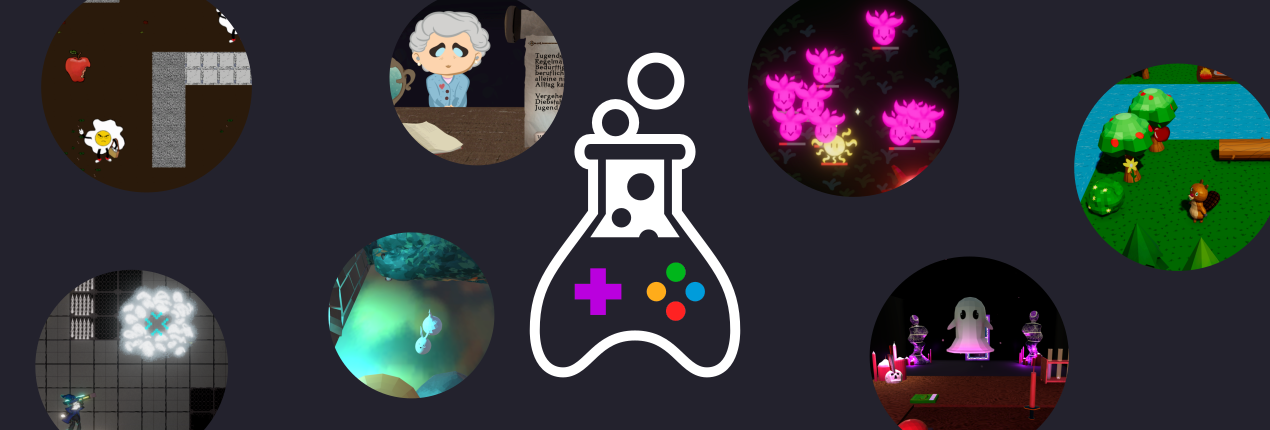
In the winter semester 2024/25, 116 students have produced a total of seven video games in our course “Projektmanagement in der Computer- und Videospielindustrie” in a weekend.
Over the course of a semester, our orga members lead workshops in the seminar to prepare students for the game jam.
In the 2D workshop, students were taught about various aspects of digital art and the conception. Among those there were aspects like concept art, user interfaces and animations. Also, the collaboration with other departments, like the 3D department, audio department and game design, played an important role in the preparation for the game jam.
The 3D workshop dealt with the creation of 3D objects in the 3D modelling software Blender, the animation of those objects, the export of those objects to the Unity Engine, as well the preparation of cross-department work. Additionally, the participants visited the StudentLab3D of the DMRC to learn about 3D printing.
The audio workshop was about the creation of sound effects, voice acting, background music for games and their workflow in FMOD Studio, and the following integration into the Unity Engine. Furthermore, the participants visited the recording studio of the Paderborn University, which was available to them during the game jam as well.
The coding workshop in this semester comprised of a basics workshop and an advanced workshop. In the workshops, the students were taught about important aspects of the Unity Engine and Visual Studio. This included, for example, the creation of 2D and 3D environments, the integration of various control options for players, animations, and the integration of sounds with the help of FMOD.
In the game design workshop, the students were taught about the basics of conception of game ideas, game worlds and mechanics. Therefore, it comprised not just of the creation of worlds per se, but also the conception of ways to interact with those to facilitate good game play. During this, the workshop also deals with story and narrative design. Supporting their role, the differences between the departments were shown and further deepened with “Internships”.
After all those preparations, the participants were ready to apply their acquired knowledge to create their own video games in the game jam weekend.
The game jam involved three days of self-organized work over a weekend in group work in smaller teams of just over 10 participants. Students had the choice between different projects, which were written by them in a separate survey and adapted to a suitable scope by the orga team. The prescribed theme of the suggestions was “energy”, although with the further requirement of not including “electricity and lasers”. From over 70 suggestions, 9 choosable games arose.
During the weekend, the teams were distributed to multiple rooms in the Paderborn University, supported by the GamesLab’s hardware and facilities like the universities’ recording studio. The work on the projects went by creatively and atmospherically relaxed.
Departments were able to do their tasks well and imaginatively in their workspaces. Game designers, for example, build prototypes of the game world with paper and the audio department recorded multiple sound effects in the hallways and in the car park in addition to using the recording studio. The teams’ artists also created posters for their games, which will soon be printed and displayed in the GamesLab. With the help of the orga team, a good work pace was achieved.
A few days later, the finished games were shown in plenum with the presence of Prof Dr. Fuchs. The game prototypes were played and presented in 15-minute presentations.
The developed games from the students’ suggestions to the topic ‘Energy (without electricity and lasers) are:
Grow Your Own Wisp, Abraca-Boom, Checkpoint Soul 2D, Checkpoint Soul 3D,
Biber‘s Beauty Palace, Harebringer of Souls, Dungeon Munchster
Closing Words
As the orga team, we are very proud of our participants from this semester. The resulting projects are products from well-applied abilities, which were developed with tons of self-dedication on the students’ side during the theoretical and practical exercises. Thereby, a large amount of the workshop learnings was used and applied in a short time for the game jam weekend.
Students‘ Work in the GamesLab during the Summer Term 2024: The Development of Three Advanced Prototypes
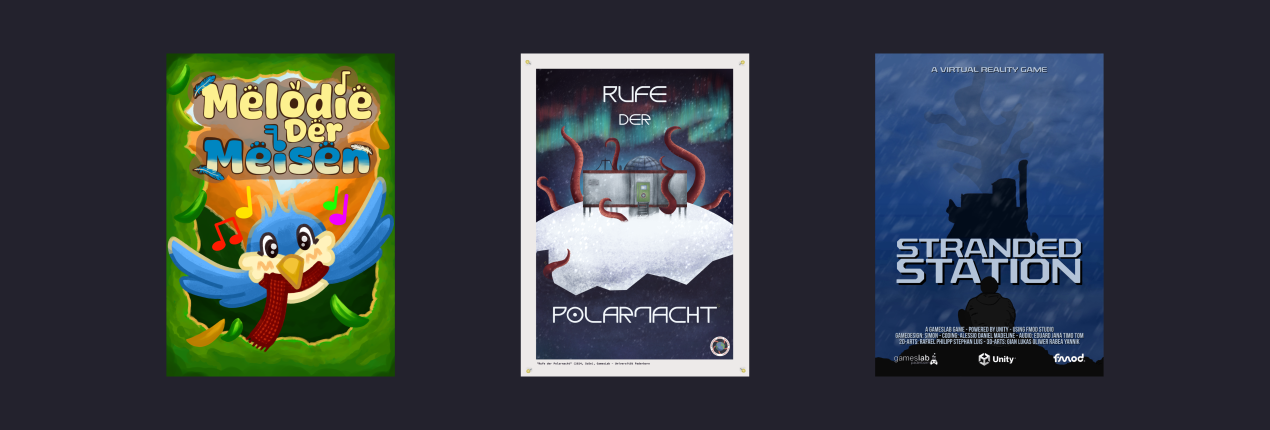
In the summer term 2024, 54 students who were also involved in the winter term 2023/24, took part in the GamesLab course and deepened their knowledge and practice of computer game development. The 54 students came from the fields of media studies, computer science, comparative literature, literature, pop music, management, linguistics, educational science, art, fashion and textile design and philosophy.
They worked in three development teams on three computer game projects: Stranded Station, Melodie der Meisen and Rufe der Polarnacht.
GamesLab in Winter Semester 2023/2024: Developmenet of Seven Game Prototypes
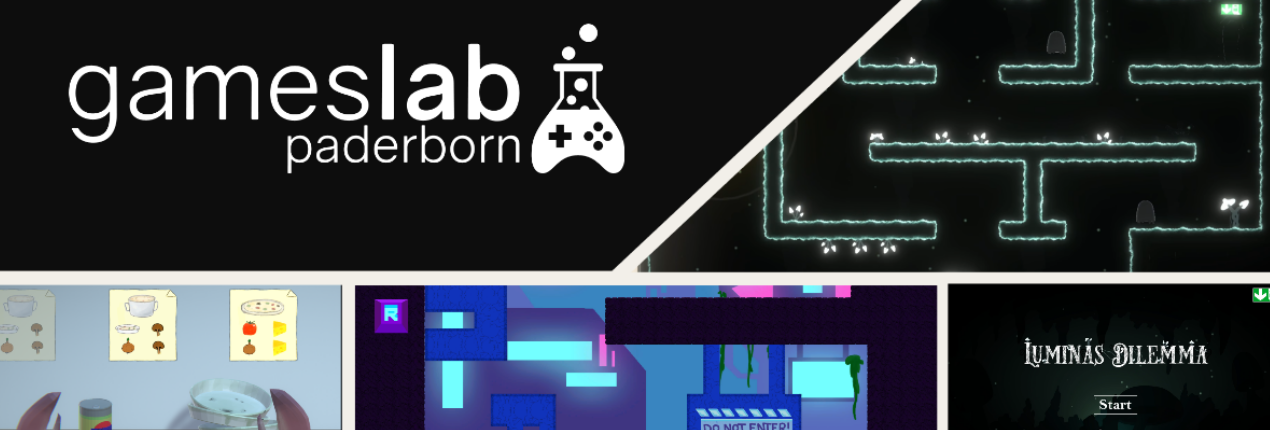
In the winter semester 2023/2024, 91 students took part in the GamesLab course. They came from degree programmes in media studies, information science, sports economics, management, pop music, comparative literature, educational science, art, fashion/textile/design, linguistics and literature. It was one of the largest courses in the GamesLab in recent years.
A total of seven computer game prototypes were produced in development teams:
Penny to the Sky, Paint it Red, Misophonia, Con Appetito, Magic Mania, Senseless, Lumina‘s Dilemma
The GamesLab in WDR Lokalzeit
WDR Lokalzeit OWL made a report about the GamesLab, which is available in the WDR/ARD long-term media library. It illustrates how students in the GamesLab develop interdisciplinary computer games and thereby further develop their skills in cooperative work and their knowledge of the various aspects of computer game development.
WDR Lokalzeit announces the report as follows: "The Gameslab at the University of Paderborn develops games with everything that goes with them: program, graphics, game rules, music, characters. Students from a wide range of disciplines work together with professional equipment and software. We visit them in the development of a current project.”
The GamesLab in the 2022/2023 academic year: The development of BossCrawl
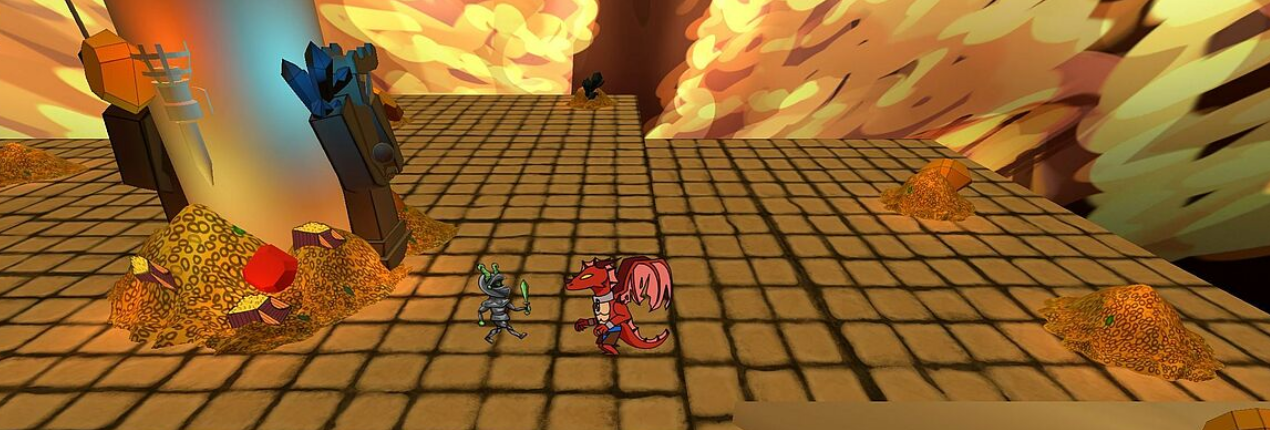
In the academic year 2022/2023, teaching in the GamesLab was organised as a two-semester event, which left sufficient time and space for ithe nterdisciplinary and cooperative learning and testing of the creative, technical, social, organisational and academic skills that are necessary in the development and research of computer games.
In winter semester 2022/2023, a total of 60 students from different study programs such as English & German linguistics, computer science, art, management, media studies, philosophy, popular music and media, or economics took part in the event and jointly developed the prototype of the computer game BossCrawl.
For the first time, the open source game engine Godot was used in GamesLab, replacing work with Unity. In addition to a new software solution, the basics of the industry-standard disciplines of 2D arts, 3D arts, audio, coding and game design were also taught and applied in a practical phase lasting several weeks.
The developed prototype represents the basic mechanics of the BossCrawl game. There are two levels. It's about a dungeon boss and a hero character competing against each other. The players control the boss character instead of saving the world as a hero as usual. This concept was carried over into the summer semester of 2023, in which it was further expanded.
In the summer semester of 2023, the development project and research into computer games was continued by 64 participating students from the subjects of English linguistics, English-language literature and culture, educational science, computer science, art and art education, mathematics, media studies, popular music and media, sports economics and economics. In addition to the prototype project, this semester's course also deals with the importance of e-sports in the media and computer gaming industry.
Summer semester 20223 Students developed three computer game prototypes
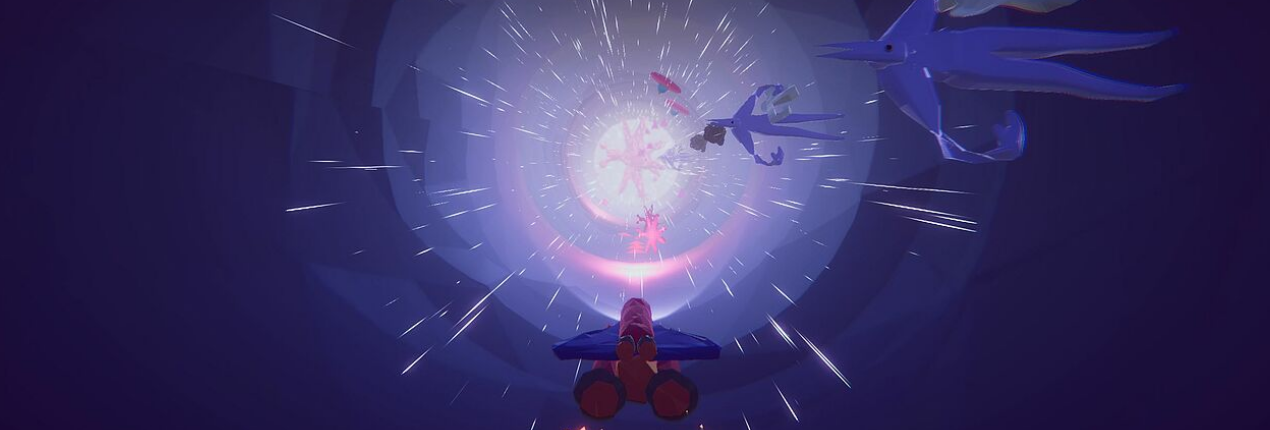
In the summer semester of 2022, the University of Paderborn and thus also the GamesLab returned to face-to-face teaching after the COVID pandemic.
34 students from various subjects such as English linguistics, English-language literature and culture, computer science, comparative literature, art, art education, management, mathematics, media studies, and philosophy took part in the GamesLab course.
In interdisciplinary teamwork, three computer game prototypes were developed as part of a so-called gamejam under the theme “move something”:
Hyper-Score is a typical side-scroller in a sci-fi setting. Players have to avoid oncoming obstacles for as long as possible. In order to improve your aiming time, power-ups were also distributed in some places, which gave short immunity to obstacles.
Shooting Golf is a particularly bizarre multiplayer game in which the players each control a forklift and play golf with it. As part of the short Gamejam format, the multiplayer aspect was removed in order to optimize the gaming experience on the map with oversized obstacles.
In Sightless, players have to find the exit in a dark room before the opponent reaches them. The room is a labyrinth in which you can orientate yourself using noises and short flashes of light. You have to stay away from the walls that cause damage to the protagonist.
Christian Fuchs: New Professor for Media Systems and Media Organisation and Academic Director of the GamesLab
Since 1 April 1 2022, Christian Fuchs has been Professor of Media Systems and Media Systems and Media Organisation at the University of Paderborn and scientific director of the GamesLab. Together with the technical director of the GamesLab Volker Spaarmann and the Gameslab organisational team, he leads the work in the Gameslab. Fuchs also supervises the courses held in the GamesLab.
Prof. Fuchs says about the GamesLab: “The GamesLab is an impressive project in which students learn in a self-organised way, work together in a transdisciplinary manner across the boundaries of individual study programs, creatively develop computer games, engage in research into computer games and gain experience in project work and cooperative work. I am pleased that I am the academic director of the GamesLab and supervise the associated teaching.”
Fuchs has interdisciplinary and international research and teaching experience. He received a diploma and doctorate in Informatics from Vienna University of Technology with a specialisation in informatics and society, completed his habilitation in the field of information and communication technologies and society at the University of Salzburg in 2008. He was a Professor of Media and Communication Studies in Sweden and Great Britain before he was appointed to Paderborn University in 2022. His research interests include media, economy & society and digital media & society.
Quick Navigation
